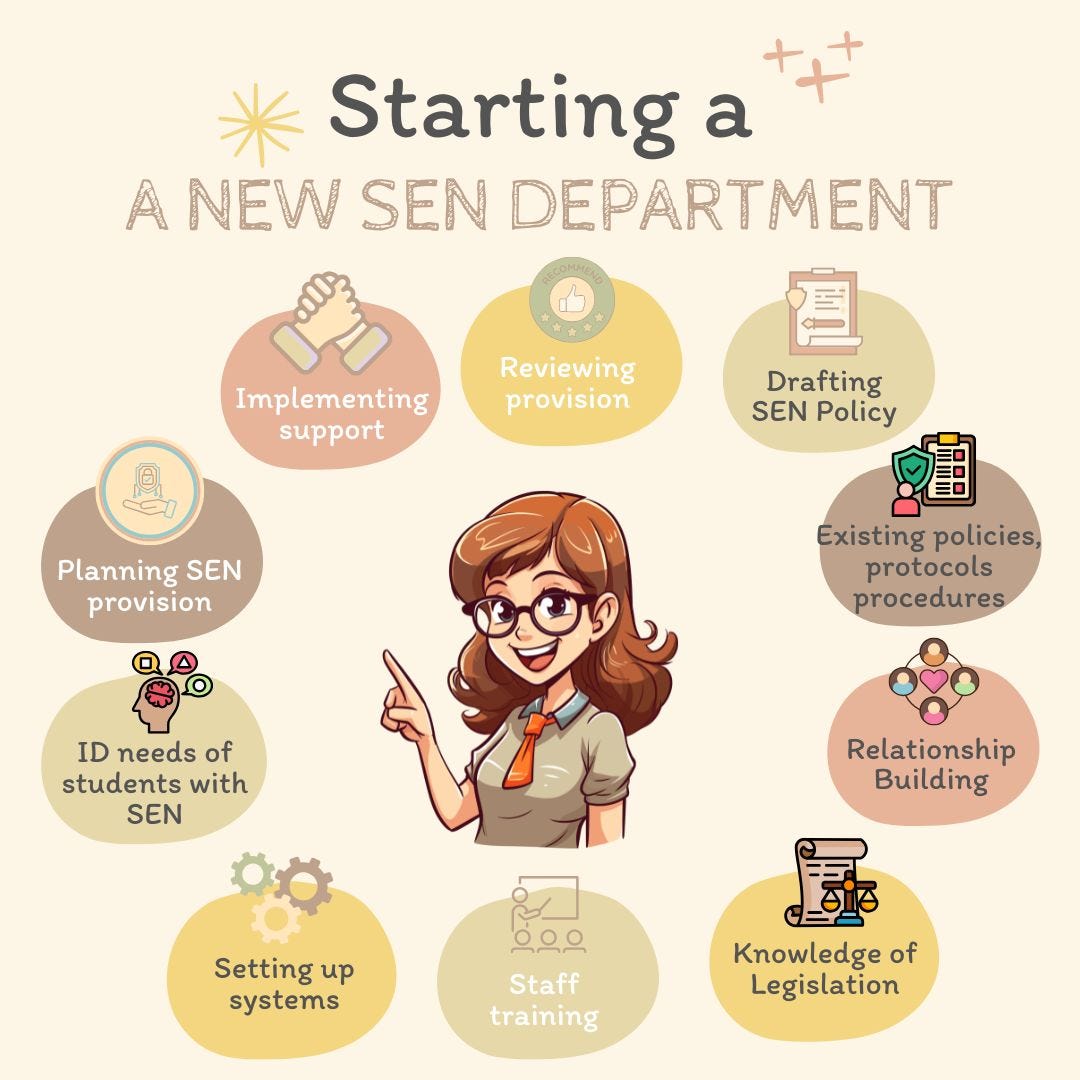The Blank Canvas
Navigating the Unknown in a New SEN Department
In my last newsletter, I touched on the unseen demands of the SENCo role and the perpetual learning curve that comes with embracing the unknown, especially when stepping into a new country and a new educational landscape. This week, I want to delve deeper into that sense of the unknown, specifically when you're not taking over an established department, but rather, building one from the ground up.
What happens when you're presented with a blank canvas, tasked with the immense responsibility of knowing where to start, what to prioritise, and how to do it all within a system that might be entirely different from anything you've experienced before? This is where the real pressure sets in. The initial excitement of a new challenge quickly gives way to a dizzying array of questions.
Bringing Order to the Unknown
To combat this feeling of being overwhelmed, I did what any self-respecting SENCo facing a blank slate would do: I consulted my inner project manager! Out came the spreadsheet, my trusty sidekick in turning chaos into something resembling a plan. It's proving invaluable for breaking down the monumental task of establishing a new department into manageable actions, helping me visualise the steps, track progress, and, crucially, understand the interdependencies of each element.
My immediate priorities are clear:
Setting up the foundational systems: This means establishing the nuts and bolts of how to adopt a 'graduated approach', to:
identify and meet the needs of pupils with SEN;
plan the provision to meet the identified needs, setting clear outcomes and detailing the support, interventions, and teaching strategies to be used;
implement the planned support; and
regularly review the effectiveness of the provision.
It’s about building the pipes before the water can flow.
Drafting a dynamic SEN policy: For now, this isn't a static document to be printed and filed away. It's very much a working document, adapting and evolving as I learn on the spot about the local context, the school's unique culture, and the specific needs of our students. Crucially, it's also a document that must integrate and align with existing school-wide policies, procedures, and protocols – from admissions and extra-curricular activities to positive handling – weaving them in as I become familiar with their nuances. It's an iterative process, much like agile development, where feedback and new insights constantly refine the blueprint.
The Unseen Foundation: Relationship Building
However, none of this system-building or policy-drafting can truly take root without the element that has always been at the core of my practice: relationship building. In a new environment, with new colleagues, parents and students, establishing trust and understanding is paramount. It's the unseen foundation that underpins every policy, every system and every successful intervention.
Navigating New Realities
Working in a system that isn't what I'm used to adds another layer of complexity. My previous experiences, while invaluable, don't always translate directly. What was standard practice before might not be here, and what's expected now might be entirely new territory. For instance, readily available access to specialist therapists and external support services that I've relied on in the past may not be as prevalent. This means a significant part of my role involves investigating creative alternatives, building these into our support plans, and gently managing parent expectations about the pace and nature of progress. It's a constant dance between adapting my expertise and learning entirely new steps. The "unseen demands" I spoke of earlier suddenly multiply, demanding not just flexibility, but also a deep well of resilience and an unwavering commitment to the children we serve.
In the coming weeks, I'll share more about navigating this ongoing learning curve. This includes the journey of going on relevant training, diligently doing my own research, becoming familiar with the local education legislation, and crucial to our success, incorporating the new school's existing protocols that impact SEN within the school. These elements are crucial as I build out our systems and policies, all while ensuring relationships remain at the heart of everything we do. It's a journey, not a sprint, and one that requires a blend of strategic thinking, an open mind, and a healthy dose of humility.




This is impressive, inclusion in schools needs commitment and being knowledgeable, this article has helped me on how to build SEN department from down up.